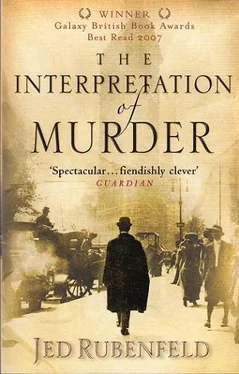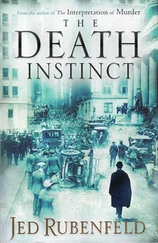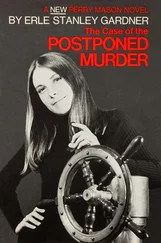Jed Rubenfeld - The Interpretation of Murder
Здесь есть возможность читать онлайн «Jed Rubenfeld - The Interpretation of Murder» весь текст электронной книги совершенно бесплатно (целиком полную версию без сокращений). В некоторых случаях можно слушать аудио, скачать через торрент в формате fb2 и присутствует краткое содержание. Жанр: Исторические приключения, на английском языке. Описание произведения, (предисловие) а так же отзывы посетителей доступны на портале библиотеки ЛибКат.
- Название:The Interpretation of Murder
- Автор:
- Жанр:
- Год:неизвестен
- ISBN:нет данных
- Рейтинг книги:5 / 5. Голосов: 1
-
Избранное:Добавить в избранное
- Отзывы:
-
Ваша оценка:
- 100
- 1
- 2
- 3
- 4
- 5
The Interpretation of Murder: краткое содержание, описание и аннотация
Предлагаем к чтению аннотацию, описание, краткое содержание или предисловие (зависит от того, что написал сам автор книги «The Interpretation of Murder»). Если вы не нашли необходимую информацию о книге — напишите в комментариях, мы постараемся отыскать её.
The Interpretation of Murder — читать онлайн бесплатно полную книгу (весь текст) целиком
Ниже представлен текст книги, разбитый по страницам. Система сохранения места последней прочитанной страницы, позволяет с удобством читать онлайн бесплатно книгу «The Interpretation of Murder», без необходимости каждый раз заново искать на чём Вы остановились. Поставьте закладку, и сможете в любой момент перейти на страницу, на которой закончили чтение.
Интервал:
Закладка:
The first night I was very tired, and went to bed right after dinner. In the morning I had breakfast with the said Thaw. After breakfast Mr Thaw said he wished to tell me something, and asked me to step into my bedroom. I entered the room, when the said Thaw, without any provocation, grasped me by the throat and tore the bathrobe from my body. The said Thaw was in a terrific excited condition. His eyes were glaring, and he had in his right hand a cowhide whip. He seized hold of me and threw me on the bed. I was powerless and attempted to scream, but the said Thaw placed his fingers in my mouth and tried to choke me.
He then, without any provocation, and without the slightest reason, began to inflict on me several severe and violent blows with the cowhide whip. So brutally did he assault me that my skin was cut and bruised. I besought him to desist, but he refused. He stopped every minute or so to rest, and then renewed his attack on me.
I was absolutely in fear of my life; the servants could not hear my outcries, for the reason that my voice did not penetrate through the large castle, and so could not come to my succor. The said Thaw threatened to kill me, and by reason of his brutal attack, as I have described, I was unable to move.
The following morning Thaw again came into my bedroom and administered a castigation similar to the day before. He took a cowhide whip and belabored me with it on my bare skin, cutting the skin and leaving me in a fainting condition. I swooned and did not know how long after I returned to consciousness.
'How horrible,' said Betty. 'But she married him — why?' 'For his dough, I guess,' said Littlemore. He leafed through the affidavit again. 'You think this is it? What Susie meant us to find?'
'It must be, Jimmy. It's the same thing that was done to poor Miss Riverford.'
'I know,' said Littlemore. 'But this is an affidavit. Does Susie seem like somebody who knows about affidavits?'
'What do you mean? It can't be a coincidence.'
'Why would she remember the day, the exact day, this affidavit got read in at the trial? It doesn't add up. I think there's something else.' Littlemore sat down on the floor, reading the transcript. Betty sighed impatiently. Suddenly the detective called out, 'Wait a minute. Here we go. Look at the Q here, Betty. That's the prosecutor, Mr Jerome, asking questions. Now look who the witness is, giving the answers.'
At the spot indicated by the detective, the transcript read as follows:
Q. What is your name?
A. Susan Merrill.
Q. State your business, please.
A. I keep a rooming house for gentlemen in Forty-third Street.
Q. Do you know Harry K. Thaw?
A. I do.
Q. When did you first meet him?
A. In 1903. He called on me to engage rooms. Which he did.
Q. For what purpose did he say?
A. He said he was engaging young ladies for work on the stage.
Q. Did he bring visitors to his rooms?
A. Mostly young women of fifteen years and on. They said they wanted to get on the stage.
Q. Did anything unusual happen at any time when any of these girls called?
A. Yes. One young girl had gone into his room. A little later, I heard screams and I ran into the room. She was tied to the bedpost. He had a whip in his right hand, and he was about to strike her. There were welts all over her.
Q. What was she wearing?
A. Very little.
Q. What happened next?
A. He was wild and hurried away. She told me he had been trying to murder her.
Q. Can you describe the whip?
A. It was a dog whip. On that occasion.
Q. Were there other occasions?
A. Another time there were two girls. One of them was undressed, the other was partly dressed. He was whipping them with a lady's riding whip.
Q. Did you ever speak with him about it?
A. Yes, I did. I told him these were all young girls and he had no right to whip them.
Q. What explanation did he make for doing it?
A. He made no explanation at all. He said they needed it.
Q. Did you ever inform the police?
A. No.
Q. Why not?
A. He said if I did he'd kill me.
Chapter Fifteen
'Come,' said Freud, changing the subject, as we walked through the park on our way from Brill's to the hotel. 'Let us hear how you are getting along with Miss Nora.'
I hesitated, but Freud assured me that I could speak as freely to Ferenczi as to himself, so I recounted the whole story at length: the illicit congress between Mr Acton and Mrs Banwell, glimpsed by the fourteen-year-old Nora, which Freud had somehow foreseen; the girl's tantrum in the hotel room, directed against me; the apparent recovery of her memory, identifying George Banwell as her assailant; and the sudden arrival of Banwell himself, together with the girl's parents and the mayor, who provided Banwell's alibi.
Ferenczi, after declaring his revulsion at the nature of the sexual act Mrs Banwell performed on Harcourt Acton — a reaction I found hard to understand, coming from a psychoanalyst — asked why Banwell couldn't have attacked Nora Acton even if he had not murdered the other girl. I explained that I had quizzed the detective on the very same point and that there was apparently physical evidence proving the two attacks were carried out by the same man.
'Let us leave the forensics to the police, shall we?' said Freud. 'If the analysis should help the police, well and good. If not, we shall at least help the patient. I have two questions for you, Younger. First, do you not find something strange in Nora's assertion that, when she saw Mrs Banwell with her father, she didn't understand at the time exactly what she was witnessing?'
'Most American girls of fourteen would be ill-informed on that point, Dr Freud.'
'I appreciate that,' Freud replied. 'But that is not what I meant. She implied that she now understood what she had witnessed, did she not?'
'Yes.'
'Would you expect a girl of seventeen to be better informed than one of fourteen?'
I began to take his point.
'How,' asked Freud, 'does she know now what she didn't know then?'
'She suggested to me yesterday,' I answered, 'that she reads books explicit in content.'
'Ah, yes, that's right, very good. Well, we must think more about this. But for now, my second question: tell me, Younger, why did she turn on you?'
'You mean, why did she throw her cup and saucer at me?'
'Yes,' said Freud.
'And hit you with boiling teapot,' added Ferenczi.
I had no answer.
'Ferenczi, can you enlighten our friend?'
'I am also in the dark,' Ferenczi replied. 'She is in love with him. That much is obvious.'
Freud addressed me. 'Think again. What did you say to her just before she became violent with you?'
'I had just finished the touching of her forehead,' I said, 'which failed. I sat down. I asked her to complete an analogy she had begun earlier. She was comparing the whiteness of Mrs Banwell's back to something else, but she broke off. I asked her to complete the thought.'
'Why?' asked Freud.
'Because, Dr Freud, you have written that whenever a patient begins a sentence, but interrupts himself and doesn't finish, a repression is at work.'
'Good boy,' said Freud. 'And how did Nora respond?'
'She told me to get out. Without warning. And then she began throwing things at me.'
'Just like that?' asked Freud.
'Yes.'
'So?'
Again I had no reply.
'Did it not occur to you that Nora would be jealous of any interest you showed in Clara Banwell? Particularly in her naked back?'
'Interest in Mrs Banwell?' I repeated. 'I've never met Mrs Banwell.'
'The unconscious does not take such niceties into account,' said Freud. 'Consider the facts. Nora had just described Clara Banwell performing fellatio on her father, which she witnessed at the age of fourteen. That act is of course repugnant to any decent person; it fills us with the utmost disgust. But Nora does not display to you any such disgust, despite implying that she fully understands the nature of the act. She even says she found Mrs Banwell's movements appealing. Now, it is quite impossible that Nora should have witnessed that scene without deep jealousy. A girl has a hard enough time bearing her own mother: she will never allow another woman to arouse her father's passion without bitterly resenting the intruder. Nora, therefore, envied Clara. She wanted to be the one performing fellatio on her father. The wish was repressed; she has nurtured it ever since.'
Читать дальшеИнтервал:
Закладка:
Похожие книги на «The Interpretation of Murder»
Представляем Вашему вниманию похожие книги на «The Interpretation of Murder» списком для выбора. Мы отобрали схожую по названию и смыслу литературу в надежде предоставить читателям больше вариантов отыскать новые, интересные, ещё непрочитанные произведения.
Обсуждение, отзывы о книге «The Interpretation of Murder» и просто собственные мнения читателей. Оставьте ваши комментарии, напишите, что Вы думаете о произведении, его смысле или главных героях. Укажите что конкретно понравилось, а что нет, и почему Вы так считаете.












